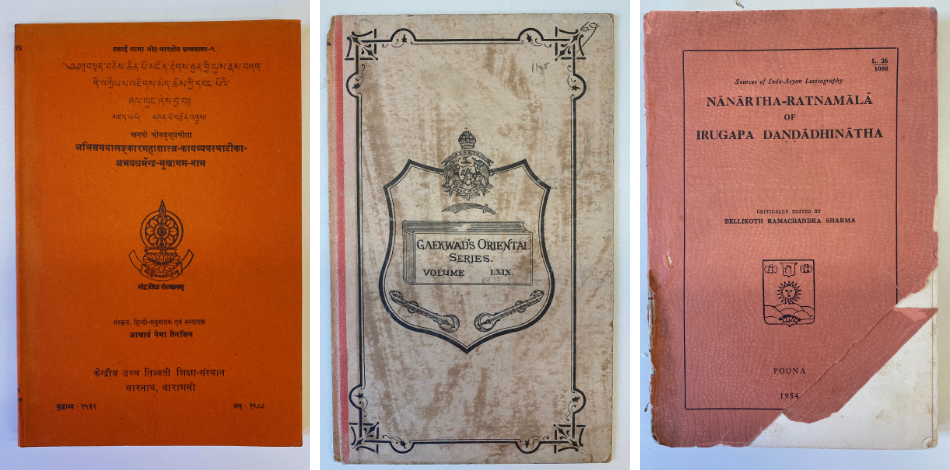Diversity in the Stacks: Old and Rare Sanskrit Series

Diversity in the Stacks aims to build library collections that represent and reflect the University’s diverse population.
The study of Sanskrit linguistics and literature has flourished at Penn for nearly 150 years, profoundly influencing the development of South Asian Studies on campus and beyond. With the hiring of Professor Morton Easton in 1883, Penn ranked among the earliest American institutions to offer courses in Sanskrit, inaugurating an ongoing lineage of influential Penn Sanskritists innovating the field. The renowned scholar W. Norman Brown leveraged interest in Sanskrit into broader disciplinary study in the mid-twentieth century; Professors Ludo Rocher, Rosane Rocher, and George Cardona ushered modern Sanskrit philology--the study of language in historical sources--into the twenty-first century; and current Professors Deven Patel and Daud Ali continue to demonstrate both the historical and contemporary liveliness of Sanskrit language.
Renewed focus on Sanskrit in India and abroad throughout the nineteenth and twentieth centuries, coupled with the contemporaneous expansion of printing presses throughout South Asia, prompted a publishing boom for Sanskrit literature. Educational institutions and publishing houses established numerous Sanskrit series that made old, rare, and foundational Sanskrit texts available to a wide-ranging audience, advancing Sanskrit revival in South Asia and feeding the philological appetites of scholars. Some of the most significant of these series included the Princess of Wales Sarasvati Bhavana Texts, the Trivandrum Sanskrit Series, the Sacred Books of the Hindus, and the Punjab Oriental Series.
One of the oldest and most prolific of the nineteenth and twentieth century Sanskrit publishers was Chowkhamba Vidyābhavana, which established its Sanskrit Series Office in 1892 under editor and Sanskrit enthusiast Haridas Gupta. Over the decades, this office has overseen publication of hundreds of volumes in more than a dozen series, and continues to offer Sanskrit works in a number of disciplines.
Although the Penn Libraries has acquired a sizable number of Sanskrit series over the years, there are occasional gaps in our collections – volumes that were overlooked upon publication release, misplaced by incautious patrons, or lost to decay over time. As part of the South Asian Cooperative Collection Development collaborative established several years ago, the Penn Libraries identified Sanskrit series gaps as an area of collecting focus. Since then, we have committed to acquiring, maintaining, and making available these volumes to patrons across North America. Working with one of our South Asia vendors last spring, we were able to locate and purchase more than 150 old and rare Sanskrit volumes that were missing from our series holdings.
Additionally, we have recently been working to render these series volumes more discoverable and accessible by expanding the information about them available in our library catalog. When these series were originally added to the Penn Libraries collections, they were often cataloged jointly under the series name. That means that dozens of volumes were included on a single record, making it difficult--if not impossible--to find a specific, individual title in the library catalog. Our enrichment project has focused on adding these individual titles to the series records so that patrons can locate works in the catalog without needing to know the name of the series to which it belongs or browsing in the physical stacks. We are also exploring the possibility of digitizing out-of-copyright works and those volumes that are in especially brittle condition due to age and acidic paper. Adding these volumes to our digital repository will help preserve these foundational Sanskrit series texts for many future generations of Sanskrit scholars.
Here are just some of the Sanskrit series that you can find in the Penn Libraries:
- Caukhambā Surabhāratī Granthamālā
- Vidyābhavana Saṃskṛta Granthamālā
- Caukhambā Amarabhāratī Granthamālā
- Gokuladāsa Saṃskṛta Granthamālā
- Panjab University Indological Series
- Kāśī Saṃskṛta Granthamālā
- Kṛṣṇadāsa Saṃskṛta Sīrīja
- Vidyāvilāsa Āyurveda Granthamālā
- Haridāsa Saṃskṛta Granthamālā
- Vidyābhavana Prācyavidyā Granthamālā
- Vrajajīvana Prācyabhāratī Granthamala
- Ānandāśramasaṃskṛtagranthāvaliḥ
- Harajīvanadāsa Saṃskṛta Granthamālā
- Mithilā Vidyāpīṭha Granthamālā
- Gaekwad’s Oriental Series
- Kāmeśvarasiṃha Darabhaṅgā Saṃskṛta Viśvavidyālayaḥ Series
Date
October 6, 2021
